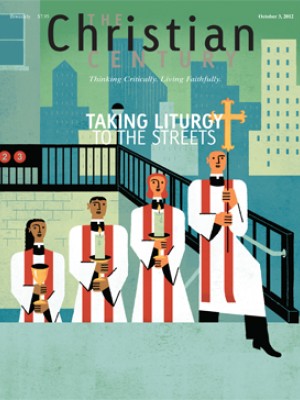Sunday, October 7, 2012: Mark 10:2-16
One summer when I was a children’s camp counselor at a Presbyterian camp in northern Indiana, I spent long days listening to what we counselors affectionately referred to as nonstop “wubbins questions.”
“Wubbins if I don’t know how to swim?”
“Wubbins if a bear comes into our cabin?”
By the end of the first month I could anticipate a wubbins before the child’s thought had fully formed. Unlike a “Why? Because I said so!” kind of exchange, there is no simple way to shut a wubbins down. And so, while other counselors guided their teenage charges through complex decisions of life and faith, I made sure that my little ones had brushed their teeth and changed their underwear—and I fielded dozens of nighttime wubbins questions.
What I failed to appreciate at the time was that I was participating in what Jesus recognized as one of the most precious and important times in the life of faith. I had been given the opportunity to welcome those children as others had welcomed me. Jesus once said, “Just as I love you, you should love one another” (John 13:34–35), and in Mark we see that Jesus’ greatest love seemed to be for the fresh, pure, innocent faith of the children.
Read our latest issue or browse back issues.
This passage, though not a traditional baptismal text, embodies the spirit of the sacrament. The ones bringing the children to Jesus are not necessarily described as parents, but as “people” moved to care for these little ones. If the adults bringing the children to Jesus were not their parents, then who were they? Why would these men and women stand up to the disciples for the sake of children who were not biologically theirs? Perhaps they felt a deep sense of love and duty to these children. Knowing that the children would grow up all too soon, they wanted to bring them into the presence of the Messiah.
I’m drawn to this image because in June my husband and I welcomed our first child. Although Hannah has yet to grace us with her first wubbins, I am already beginning to understand a child’s life of faith in new ways. As we navigate the waters of new parenthood, we are already experiencing the need for people who help us lift Hannah into the presence of Christ. Their presence in her life is not a luxury but a necessity.
At four weeks, Hannah has already given us glimpses of great joy and great challenges. There is nothing more precious than watching her discover the world. At the same time, there is nothing more draining than the necessary efforts to be constantly present to feed her, protect her and soothe her. If it weren’t for both our biological family and our church family, I don’t know how we would have survived the first month.
That extended family hugs her and helps us teach her to become the person God has created her to be. She needs others to be there for her when our patience has run out and our perspective has grown nearsighted. This is what we demonstrate when we baptize a child into the household of God—that we cannot be faithful Christian parents without the help of other faithful people in our lives. One of the Spirit’s gifts to us in baptism is the assurance of community found in the membership of Christ’s body, the church.
My husband and I are associate pastors in the same congregation. Without discussion or hesitation, we both agreed that when Hannah is baptized we want to be there—not as pastors, but as her parents. It will be freeing to have other people pray over her, pour water over her and make promises to love and teach her about Jesus. How wonderful that we do not have to do this alone!
Now that Hannah is with us, I read this text with new eyes. Just as the Pharisees seem to have become preoccupied with legalistic issues, Hannah, like all children, will have her whole life to get caught up in the complicated details of faith. Our hope is that long before those days arrive, the people in our lives, just like the people in this passage, will be there to lift Hannah into the presence of Jesus when our arms have grown too tired. They will walk with her through years of Sunday school and summer camp, answering her questions while Mom and Dad are running around tending to the less important matters of church life.
I wish I’d been more patient when I was listening to those campers’ questions. I wish I’d seen myself not as the junior counselor who got stuck with the elementary age group for yet another week, but as one of those people who had relieved weary parents of their energetic children and given those little ones the greatest gift of all: an understanding of Jesus’ fierce love for them. I think about how one day Hannah will, like the Pharisees, find that her pure childlike faith has become inevitably blurred with the complications of this broken world.
When my husband and I hand Hannah over to Christ and his church at her baptism, people will promise to answer her wubbins questions and love her like their own. If there is one thing I hope she learns as a child and remembers as an adult, it is how much she is loved. Thank God for the gift that is the church—and for the children who fill it with life.




